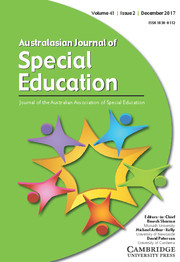No CrossRef data available.
Article contents
A Comparison of Learning by Mentally Retarded Adolescents under Direct and Vicarious Conditions
Published online by Cambridge University Press: 26 February 2016
Extract
Specialised methods that are geared toward individualized programs may prove ineffectual with the moderately retarded child when instruction is provided in a small group setting. The demands of attending behaviour and observing behaviour may conflict. The effects of vicarious learning may depend upon active verbalization by observers (Cullinan, 1976) the provision of verbal rules, task complexity and the gender of the observer and model (Litrownik, Franzini and Turner, 1976), the combination of modelling and verbal cues Yoder and Forehand, 1974) and the utilization of self-reinforcement and self-instruction techniques (Guralnick, 1976). Others have studied the effects of reinforcement given to one subject while a second observes (Bandura and Walters, 1963; Barnwell and Sechrest, 1965). Studies have examined the effects of vicarious reinforcement upon behavioural problems in educational settings (Becker, Engelmann and Thomas, 1971; Broden, Bruce, Mitchell, Canter and Hall, 1970; Meacham and Weisen, 1969) and upon work performance in a sheltered workshop setting (Kazdin, 1973).
- Type
- Research Article
- Information
- Copyright
- Copyright © The Australian Association of Special Education 1978


